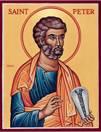1 Peter: The Word of the Lord
I PETER 1:25

Scripture verse: “But the word of the Lord endures forever.”
Objectives:
- Students should memorize the verse and know its meaning and context.
- Students should understand the formation of the canon of Scripture.
- Students should know the meaning of “sola scriptorum” and its fallacy.
Background on the book:
This letter was written by the apostle Peter, one of the Lord’s disciples. Since Peter uses his Greek name, Peter, and not his Jewish name, Simon, we know that he is writing to Gentile believers, Greeks scattered throughout Asia Minor. Remember that Peter at Pentecost became the first leader of the church in Jerusalem. He then traveled throughout Asia Minor and ended his ministry in Rome. Peter did not speak Greek well and used Silas to help translate and write down his message. (Remember Silas from Paul’s 2nd missionary journey?) Peter wrote the letter from Rome sometime between his arrival there around AD 50 and his martyrdom AD 67 under Nero. The church was under persecution worldwide and Christians were suffering great trials. In fact, the letter may have been written immediately after the martyrdom of Paul and carried by Silas back to Asia Minor, along with news of Paul’s death.
Possible Lesson Plan:
- Open with prayer.
- Review the background of the letter. Who was Peter? Can you remember some tales about Peter in the gospels and the book of Acts? (called as a fisherman, walking on water, denial, Pentecost, vision at Joppa)
- Scripture lesson: Read I Peter 1:24-25. Read also II Peter 1:16-21, II Timothy 3:16-17. Are the Scriptures tried and tested and found to be true? Is the Bible full of mistakes, as some people claim? No one has ever been able to prove this; God’s Word has stood and will continue to stand against all the arguments raised by all the “smart” people. The Bible is true and trustworthy. Easy verse to memorize; try musical chairs again, using ALL of our verses so far. Student left standing can stay in the game if he can quote a verse.
- What is Scripture? Where did the books of our Bible come from? The Old Testament books were known to the Jewish people and accepted by Jesus Himself. What about the gospels and the letters? Surely many people wrote letters and Paul and Peter wrote many more that they themselves mention but are “lost”. How did the Church decide which gospels and letters to include and which to exclude? Many were of doubtful authorship; others of doubtful accuracy. The ones that remain have been accepted by the Church as authentic and accurate since the days of Constantine. Constantine himself asked the great church historian Eusebius to make 50 copies of the Bible; Eusebius by research included the same 27 books in the New Testament as are accepted today. The Council at Carthage in 397 AD established the canon of Scripture. Can you name the 27 books of the New Testament?
- What is the fallacy of the Protestant doctrine “sola Scriptorum” or “Scripture alone”? In response to misinterpretations and errors and Roman Catholic practices and doctrines that were clearly contrary to Scripture, many Protestants have decided that all doctrine and history must come only from the books of Scripture. Church history and the Church fathers who lived after New Testament days have no input or bearing and do not need to be studied. But who decided which books would be in the Bible anyway? Would there be a canon of Scripture at all had it not been for the Church fathers and councils? And what about II Peter 1:16-21? With no Church fathers to help in interpretation, doctrines can be “proven” that are clearly heretical and have been dealt with by the Church before. Does a Christian need to study and learn from the Bible? Yes, of course. Should a Christian study only the Bible and not the Church fathers and Church history?
- How well do you know your Bible? Have each student have his Bible poised and ready. The leader will read out a New Testament reference, e.g. Romans 6:1. The students will race to see who can find it first. The student who finds it first should stand and read it to the class. He gets a point. At the end of the game (10-20 references, depending on speed), the student with the most points wins. A bookmark would make a great prize!
- Close with prayer.